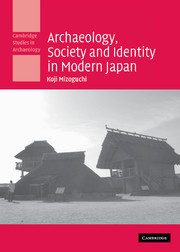Book contents
- Frontmatter
- Contents
- List of figures
- List of tables
- Preface
- 1 Archaeology in the contemporary world
- 2 Modernity and archaeology
- 3 Communication, sociality, and the positionality of archaeology
- 4 Nation-state, circularity and paradox
- 5 Fragmentation, multiculturalism, and beyond
- 6 Conclusion: demands for problematising and explaining one's position all the time
- References
- Index
- CAMBRIDGE STUDIES IN ARCHAEOLOGY
4 - Nation-state, circularity and paradox
Published online by Cambridge University Press: 22 September 2009
- Frontmatter
- Contents
- List of figures
- List of tables
- Preface
- 1 Archaeology in the contemporary world
- 2 Modernity and archaeology
- 3 Communication, sociality, and the positionality of archaeology
- 4 Nation-state, circularity and paradox
- 5 Fragmentation, multiculturalism, and beyond
- 6 Conclusion: demands for problematising and explaining one's position all the time
- References
- Index
- CAMBRIDGE STUDIES IN ARCHAEOLOGY
Summary
Introduction
As mentioned above, the connection between nationalism and archaeology is now well recognised (e.g. Hodder, ed. 1991, Diaz-Andreu and Champion 1996, Kohl and Fawcett 1996). Innumerable papers have been written describing the ways in which particular elements of nationalism and archaeology are connected. It has also been pointed out that individual nation-states functioned, and still function, as the boundary-markers of the contexts in which specific connections between modern institutions and archaeology were, and are, constituted and reproduced. However, the mechanism and process at work behind the seemingly organic interdependence between nationalism, modernity and archaeology do not appear to be fully investigated. For instance, why was archaeology mobilised particularly intensively in the constitution of national identity? The question has often been answered by referring to the artificiality, or constructedness, of the modern nation-state and its necessary masking/naturalisation, and it has been claimed that archaeology and archaeological narratives have been mobilised to naturalise/mask it (e.g. Sorensen 1996). However, the question still remains: why archaeology? Why has archaeology been mobilised to fulfil that function in such an intensive manner?
I proposed a tentative answer to this question in Chapter 3 by arguing that archaeological material suits the function of a symbolic communication medium which, being connected to transcendental concepts and beings such as primordial ethno-national identities and, in the case of Japan, the emperor and his genealogical longevity (cf. Smith 1986, 2001, 51–57), helps to reproduce communication systems necessary for the maintenance of a modern nation-state across time and space within the boundary of that nation-state.
- Type
- Chapter
- Information
- Archaeology, Society and Identity in Modern Japan , pp. 55 - 120Publisher: Cambridge University PressPrint publication year: 2006
- 1
- Cited by

